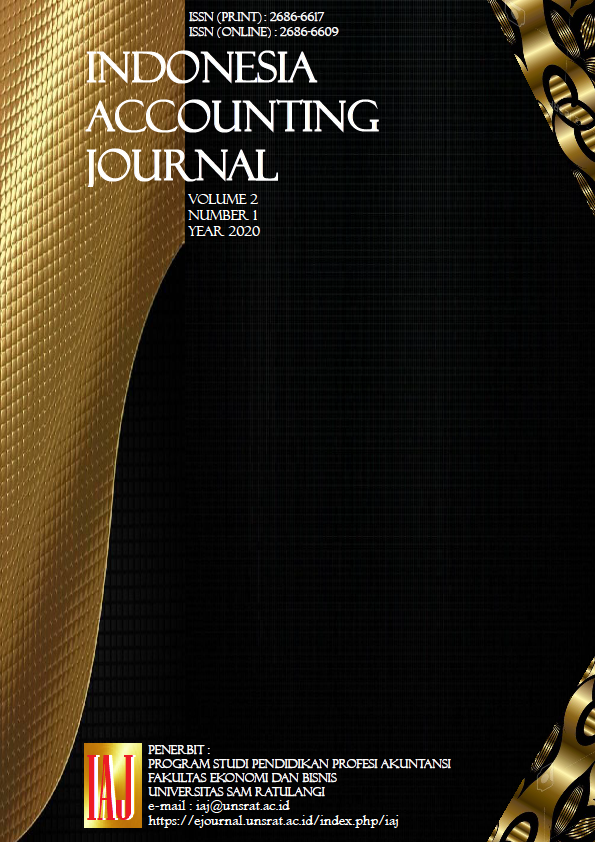Evaluasi pelaksanaan belanja modal pada Dinas Perindustrian dan Perdagangan Daerah Provinsi Sulawesi Utara
DOI:
https://doi.org/10.32400/iaj.27289Keywords:
capital expenditure, expenditure, accounting, governmentAbstract
Capital expenditure is a government activity that is to add fixed assets with a useful life of more than one fiscal year. Presidential Regulation Number 16 Year 2018 serves as a guideline for each agency as implementing capital expenditure activities. This study aims to evaluate whether the implementation of capital expenditure at the North Sulawesi Provincial Industry and Trade Office is in accordance with regulations. The method used in this research is descriptive analysis method. The results showed that the implementation of capital expenditure at the North Sulawesi Provincial Industry and Trade Office was in accordance with Presidential Regulation No. 16 of 2018 as a standard for implementing capital expenditure and was well planned.
References
Rahardjo, A. (2011). Pengelolaan pendapatan dan anggaran daerah. Yogyakarta: Graha Ilmu.
Octora, F. E., & Pontoh, W. (2013). Analisis hubungan pendapatan asli daerah, dana alokasi umum, dan dana alokasi khusus atas belanja modal pada pemerintah daerah Kabupaten Tolitoli Provinsi Sulawesi Tengah. Jurnal Accountability. 2(3), 1-10. DOI: https://doi.org/10.32400/ja.2337.2.1.2013.1-10.
Peraturan Menteri Dalam Negeri Republik Indonesia Nomor 33 Tahun 2017 tentang pedoman penyusunan anggaran pendapatan dan belanja daerah tahun anggaran 2018.
Peraturan Menteri Dalam Negeri Republik Indonesia Nomor 13 Tahun 2006 tentang pedoman pengelolaan keuangan daerah.
Peraturan Menteri Dalam Negeri Nomor 64 Tahun 2013 tentang penerapan standar akuntansi pemerintahan berbasis akrual pada pemerintahan daerah.
Peraturan Menteri Keuangan Nomor 105/PMK.02/2008 tentang petunjuk peyusunan dam penelaahan dan penyusunan anggaran kementerian negara/lembaga dan penyusunan, penelahaan, pengesahan dan pelaksanaan daftar isian pelaksanaan anggaran.
Peraturan Pemerintah Republik Indonesia Nomor 58 Tahun 2005 tentang pengelolaan keuangan daerah.
Peraturan Pemerintah Republik Indonesia Nomor 71 Tahun 2010 tentang standar akuntansi pemerintahan.
Peraturan Presiden Nomor 16 Tahun 2018 tentang pengadaan barang/jasa pemerintah.
Rondonuwu, G. C., Morasa, J., & Wokas, H. R. N. (2018). Analisis pelaksanaan sistem akuntansi pengeluaran kas belanja modal dan belanja pegawai pada Badan Pengelola Pajak dan Retribusi Daerah Kota Bitung. Going Concern:Jurnal Riset Akuntansi, 13(3), 2686-4215. https://doi.org/10.32400/gc.13.03.20296.2018.
Sadeli, L. (2015). Dasar-dasar akuntansi. Jakarta: Bumi Aksara.
Suwanda, D., & Nasution, D. R. (2015). Bagan akun standar. Cetakan pertama. Bandung: PT. Remaja Rosdakarya Offset.
Syafitri, L. (2012). Analisis implementasi akuntansi belanja modal pada pemerintah Kota Palembang. Forum bisnis dan kewirausahaan, Jurnal Ilmiah STIE MDP. 2 (1), 52-58. http://eprints.mdp.ac.id/677/1/5.%20Lili%20Syafitri.pdf
Undang-Undang Republik Indonesia Nomor 23 Tahun 2014 tentang pemerintah daerah.
Uhise, S. (2013). Dana Alokasi Umum (DAU) pengaruhnya terhadap pertumbuhan ekonomi Sulawesi Utara dengan belanja modal sebagai variabel intervening. Jurnal EMBA. 1(4), 1677-1686. https://ejournal.unsrat.ac.id/index.php/emba/article/view/3347/2897
Watulingas, G., Sondakh, J. J., & Datu, C. (2017). Evaluasi sistem dan prosedur belanja modal di Dinas Kesehatan Kota Manado. Jurnal EMBA. 5(2), 1070-1080. https://ejournal.unsrat.ac.id/index.php/emba/article/view/16064/15570
Downloads
Additional Files
Published
Issue
Section
License
The articles published in Indonesia Accounting Journal are licensed under Creative Commons Attribution 4.0 International License with authors as copyright holders.
Â

This work is licensed under a Creative Commons Attribution 4.0 International License.
Â
Under this license then authors free to:
- Share — copy and redistribute the material in any medium or format.
- Adapt — remix, transform, and build upon the material for any purpose, even commercially.
Under the following terms :
- Attribution — You must give appropriate credit, provide a link to the license, and indicate if changes were made. You may do so in any reasonable manner, but not in any way that suggests the licensor endorses you or your use.
- No additional restrictions — You may not apply legal terms or technological measures that legally restrict others from doing anything the license permits.
Notices:
- You do not have to comply with the license for elements of the material in the public domain or where your use is permitted by an applicable exception or limitation.
- No warranties are given. The license may not give you all of the permissions necessary for your intended use. For example, other rights such as publicity, privacy, or moral rights may limit how you use the material.


